
One thing that makes royal weddings so special is that, from beginning to end, they’re embellished with centuries-old traditions. It was no exception in the case of Prince Harry’s wedding with American actress Meghan Markle. For instance, as a royal bride, Ms. Markle was traditionally loaned a tiara by the Queen. The one that adorned Ms. Markle –or as her title now goes, the Duchess of Sussex–originally belonged to Her Majesty’s grandmother, Queen Mary. It was designed in 1932 to incorporate a separable brooch that Mary received as a wedding present on her special day in 1893.
The sprigs of myrtle in the bridal bouquet is a tradition that began in 1840. Queen Victoria reportedly included the flower in her own bridal bouquet. When she subsequently received a gift of myrtle from the grandmother of her spouse, Prince Albert, Victoria had it planted at Osborne House on the Isle of Wight, a favorite residence of Queen Victoria and her Prince Consort. A sprig of the same myrtle plant was used for the wedding of Princess Victoria, one of the daughters born to Queen Victoria and Prince Albert, and ever since has been included in the wedding bouquet of all royal brides, including Elizabeth II.
Not only did the bride’s outfit follow tradition, so too did the groom’s. Prince Harry, now the Duke of Sussex, wore the frock-coat uniform of his military regiment, the Blues, and Royals, just like any other male in the family on their wedding day.
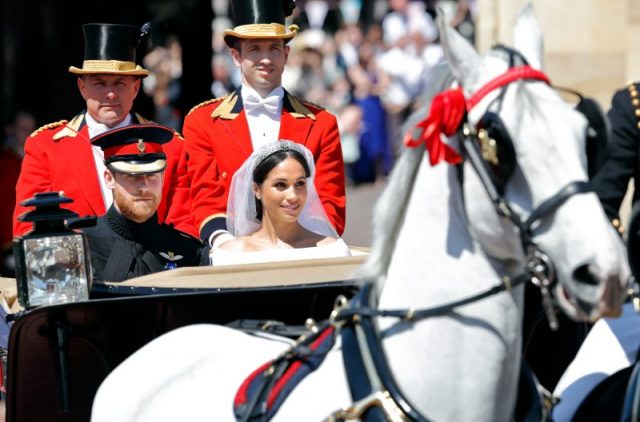
Prince Harry, Duke of Sussex and Meghan, Duchess of Sussex travel in an Ascot Landau carriage (pulled by four Windsor Grey horses) as they begin their procession through Windsor following their wedding at St George’s Chapel, Windsor Castle on May 19, 2018, in Windsor, England. (Photo by Max Mumby/Indigo/Getty Images)
However, for all of this to take place, it required the consent of the Queen herself, which also takes a special protocol and is a tradition in its own right, one incorporated into British law ever since 1707.
Her Majesty’s formal consent for the marriage union between her grandson and Meghan Markle is recorded in a document called the Instrument of Consent. An image of the special document was released by Buckingham Palace a day ahead of the wedding ceremony; it is handwritten on vellum and illuminated with designs that represent the royal bride and groom, and their heritage.
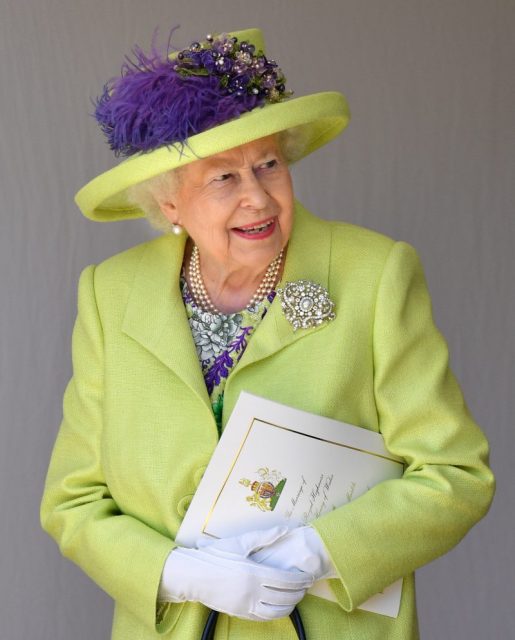
Queen Elizabeth II attends the wedding of Prince Harry to Ms. Meghan Markle at St George’s Chapel, Windsor Castle on May 19, 2018, in Windsor, England. (Photo by Pool/Max Mumby/Getty Images)
Earlier in 2018, the Queen approved the wedding at a privy council meeting. However, she now needed to abide with the Succession to the Crown Act (a law originally passed in 1707 and amended in 2015). Without the written declaration from the 92-year-old reigning monarch, Prince Harry, who falls sixth in the line of succession to the throne, would have otherwise been stripped of the possibility of ever becoming a reigning monarch himself–and the marriage itself declared “null and void.”
On a side note, the Royal Marriages Act 1772 required all descendants of George II (who, interestingly enough, was the last British king to appear on a battlefield) to obtain permission from the current monarch in order to marry. The law was slightly altered in 2013 so that only the first six persons in line to the throne must obtain such permission; Prince Harry was obviously not spared the protocol.
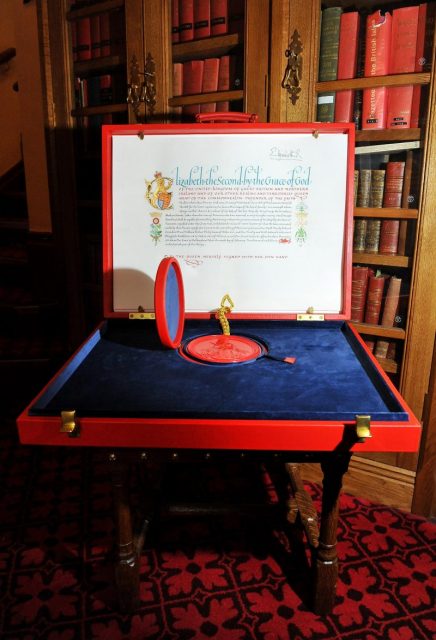
The ‘Instrument of Consent’, which is the Queen’s historic formal consent to Prince William’s forthcoming marriage to Kate Middleton, is seen at the Crown Office at the House of Lords, London (Photo by Clive Gee/WPA Pool/Getty Images)
The Instrument of Consent was signed “Elizabeth R.” by Her Majesty Queen Elizabeth II, with the letter R denoting Regina, the Latin word for queen. The Great Seal of the Realm can be spotted at the end of the document, part of the document, which uses the official first name, Henry, for Prince Harry, goes as follows:
“NOW KNOW YE that We have consented and do by these Presents signify Our Consent to the contracting of Matrimony between Our Most Dearly Beloved Grandson Prince Henry Charles Albert David of Wales, K.C.V.O., and Rachel Meghan Markle.”
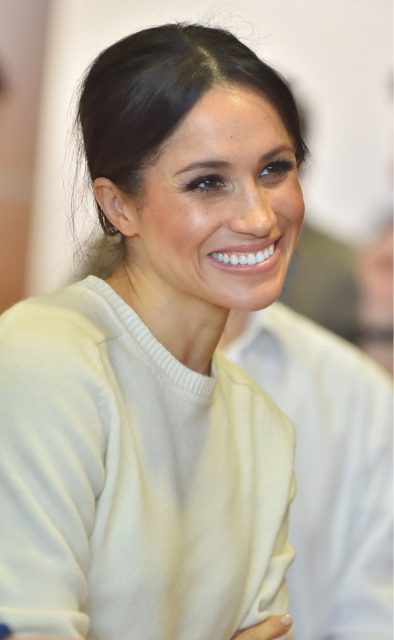
Meghan Markle in March 2018 Photo By Northen Ireland Office CC By 2.0
It has been noted that, unlike Kate Middleton, Duchess of Cambridge, in the Instrument of Consent for her marriage to Prince William in 2011, Meghan Markle is not referred to as “our trusty and well-beloved.” However, this is simply another tradition of legal terminology; only citizens of Great Britain or the Queen’s overseas Realms can be called “trusty and well-beloved” and the Duchess of Sussex is not (yet) a British citizen.
Noticeable on the document are the designs on the left and the right side of the text. Included on the left is a red dragon, the emblem of Wales; three small escallops in red, taken from the Spencer family’s heraldic arms, Princess Diana of Wales’ family; and the rose, thistle, and shamrock, representing England, Scotland, and Ireland.
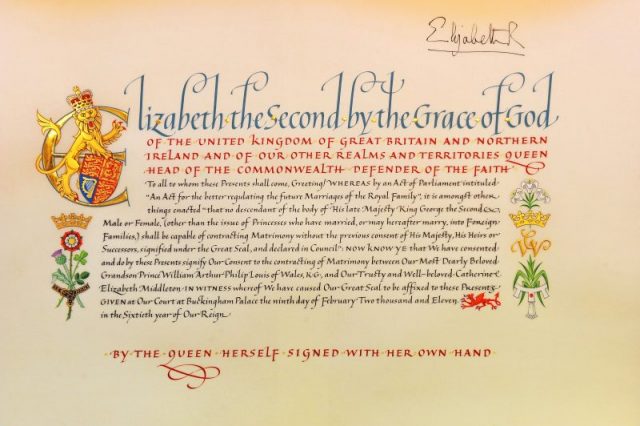
Queen Elizabeth’s Formal Consent To Royal Wedding (Photo by Clive Gee/WPA Pool/Getty Images)
On the opposite side, for Ms. Markle, is a design that depicts a similar rose, the U.S.’s national flower. There are also four poppies colored gold, a reference to Markle’s birthplace of California, and the olive branches seen on the Great Seal of the United States. The historical document includes the Commonwealth emblem, hinting at the royal couple’s pledge to follow suit as ambassadors of all the countries that are part of the Commonwealth of Nations.
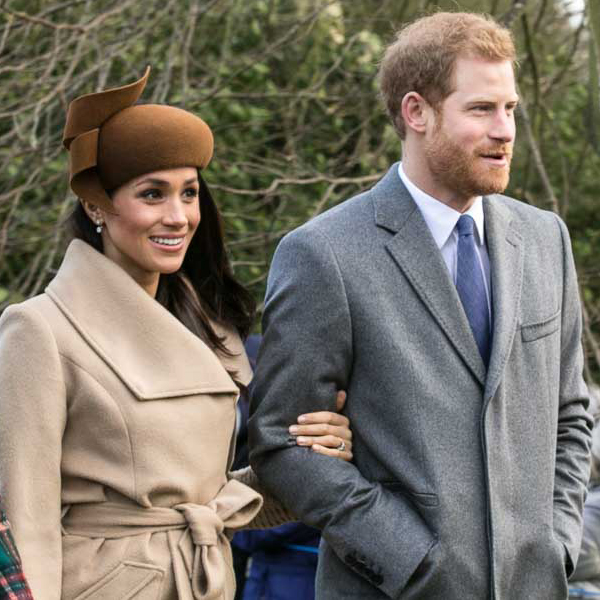
Markle and Prince Harry attending church on Christmas Day, 2017 Photo by Mark Jones CC-BY 2.0
The vellum document, which is an exquisite parchment made from calf’s skin, was drafted by the Crown Office, and as the Buckingham Palace announcement explains, this type of parchment is reserved “only for important State documents.”
Had Harry failed to gain the permission of his grandmother, his marriage would have been invalid. Not only himself but any of his children or grandchildren would have also been excluded from ever being considered to wear the Crown. As the line of succession goes, he remains behind his father, Prince Charles; his brother, Prince William; and his nephews and niece, the children of William and his wife.
